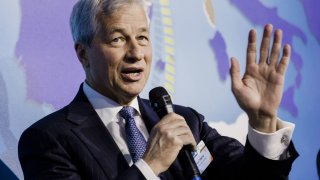
- JPMorgan Chase has been "effectively stockpiling" cash rather than using it to buy Treasuries or other investments because of the possibility higher inflation will force the Federal Reserve to boost interest rates, Dimon said Monday during a conference.
- "We have a lot of cash and capability and we're going to be very patient, because I think you have a very good chance inflation will be more than transitory," said Dimon, longtime JPMorgan CEO.
- The bank now expects $52.5 billion in net interest income in 2021, down from the $55 billion it disclosed in February, as the firm stockpiled cash and on lower credit card balances.
Jamie Dimon believes cash is king – at least for the time being.
JPMorgan Chase has been "effectively stockpiling" cash rather than using it to buy Treasuries or other investments because of the possibility higher inflation will force the Federal Reserve to boost interest rates, Dimon said Monday during a conference. The biggest U.S. bank by assets has positioned itself to benefit from rising interest rates, which will let it buy higher-yielding assets, he said.
"We have a lot of cash and capability and we're going to be very patient, because I think you have a very good chance inflation will be more than transitory," said Dimon, longtime JPMorgan CEO.
Get top local stories in Southern California delivered to you every morning. >Sign up for NBC LA's News Headlines newsletter.
"If you look at our balance sheet, we have $500 billion in cash, we've actually been effectively stockpiling more and more cash waiting for opportunities to invest at higher rates," Dimon said. "I do expect to see higher rates and more inflation, and we're prepared for that."
Dimon waded into the ongoing debate on whether higher inflation is a result of temporary aspects of the reopening, like raw material shortages or supply chain issues, or if it could be more lasting. Fed officials have called the current spike in inflation transitory, meaning temporary and short-lived. But there are increasingly voices, including Deutsche Bank economists and hedge fund billionaires, who warn of consequences should the Fed ignore inflation.
Read more from CNBC Pro:
Money Report
How long will rising inflation last? We polled 30 market strategists, and here's what they said
Later Monday, Morgan Stanley CEO James Gorman told CNBC's Wilfred Frost on Closing Bell that he, too thinks that higher inflation may be lasting and the Fed may be forced to hike rates earlier than expected.
"The question is when does the Fed move?" Gorman said. "It has to move at some point, and I think the bias is more likely earlier than what the current dots suggest, rather than later."
JPMorgan's move to accumulate cash accounts for about half of the decrease in anticipated net interest income this year, Dimon said. The other half comes from lower credit card balances, he said. The bank now expects $52.5 billion in net interest income in 2021, down from the $55 billion it disclosed in February.
In the wide-ranging discussion, Dimon struck on several familiar themes. He warned that banks were under threat from fintech and Big Tech players including PayPal, which has a larger market capitalization than nearly all U.S. banks.
Dimon disclosed that the bank's automated investing service You Invest has garnered about $50 billion in assets, despite the fact that "we don't even think it's a very good product yet."
The bank's second-quarter revenue from trading will be "a little north of $6 billion," which is lower from the "exceptional" period a year ago, Dimon said. Investment banking revenue is headed about 20% higher than a year ago and could be one of the bank's best quarters on strength in mergers advice and equity and debt issuance, he said.
Become a smarter investor with CNBC Pro.
Get stock picks, analyst calls, exclusive interviews and access to CNBC TV.
Sign up to start a free trial today.






